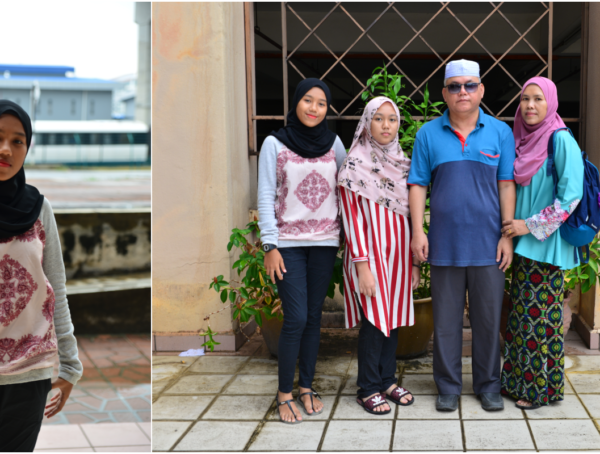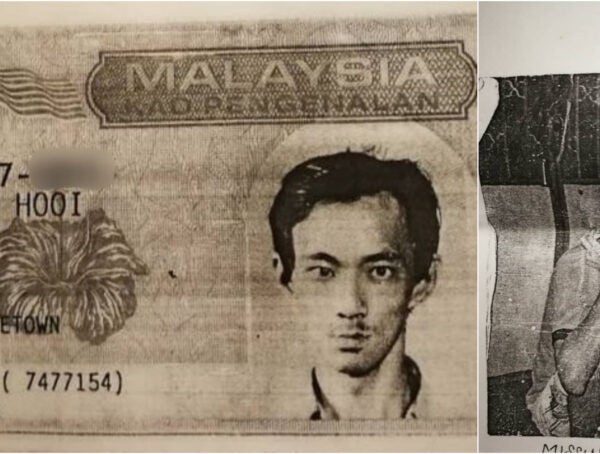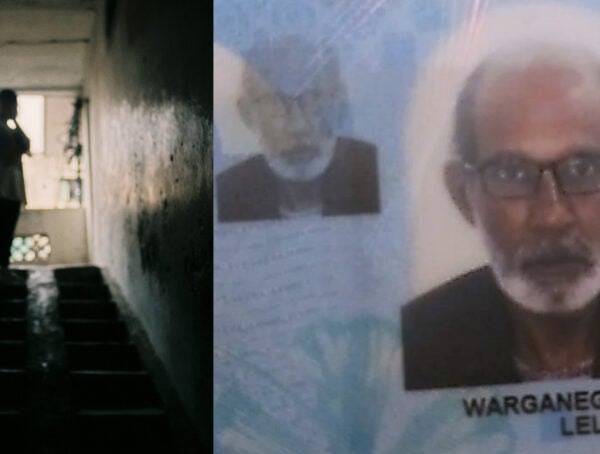Disclaimer: In Real Life is a platform for everyday people to share their experiences and voices. All articles are personal stories and do not necessarily echo In Real Life’s sentiments.
Written by Mohani
I’m Sha Roose, a disability advocate with a Youtube channel called Aitelyu! I am 36 years old, I live in Ampang, and I have Spinal Muscular Atrophy (SMA).
SMA is a disease where the muscles become increasingly weak, to the point people with SMA lose the ability to move, walk, eat or breathe without assistance.
According to statistics, 1 in 10,000 babies worldwide are born with this inherited disease. Despite how common it is, unfortunately the cheapest treatment for SMA can cost up to RM1 million per year.
I can get around on a motorised scooter but I can’t walk, travel solo, live alone, hike, rock climb, or drive a car in Malaysia. I try to live my best life despite my disability, but we must accept that every individual has barriers.
The stigma I face as an OKU
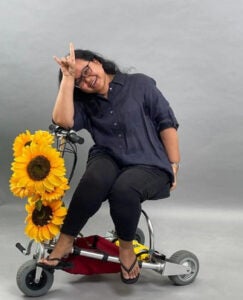
People often ask me about the stigma I face as someone with SMA. Forget SMA – there’s a deeply-rooted stigma towards people with disabilities, period.
Malaysia’s Disability Act 2008 has no teeth, and we still aren’t given access to many places, including bathrooms.
If we are seen in a wheelchair or with any assistive device, we will likely be spoken down to or about.
We will hardly be addressed with any capacity for decision-making, and we are often treated as if our lived experiences are not valid enough – as if we do not know how to negotiate our own disease.
Suddenly, everyone around us becomes a sagely medical practitioner dispensing unwelcome advice, which is irritating at best and life-threatening at worst.
We are also seen as sources of inspiration porn, here to inspire you with what we can achieve.
People often invalidate my experience
Here are some of the things people have done or said around me that invalidated my experience:
- “It’s okay, we can just carry you.” (No, you can’t and please don’t touch me.)
- “Does she need anything?” (Referring to me while talking to my companion. I can speak for myself. In fact, I frequently make the decisions in my social group.)
- “You were fine until a moment ago!” (Like for example, when I fell down at the canteen of my college, but to be honest it happens throughout all my life especially when I have bad muscle days.)
- “You’re not trying hard enough.”
- “You’re such an inspiration!”
- “I know someone who has the same condition as you. Here’s how they cured themselves.”
- “That scooter looks like so much fun, I wish I had one!”
So, folks, please be more aware and considerate.
How to dismantle the ableist beliefs that Malaysians have about OKU
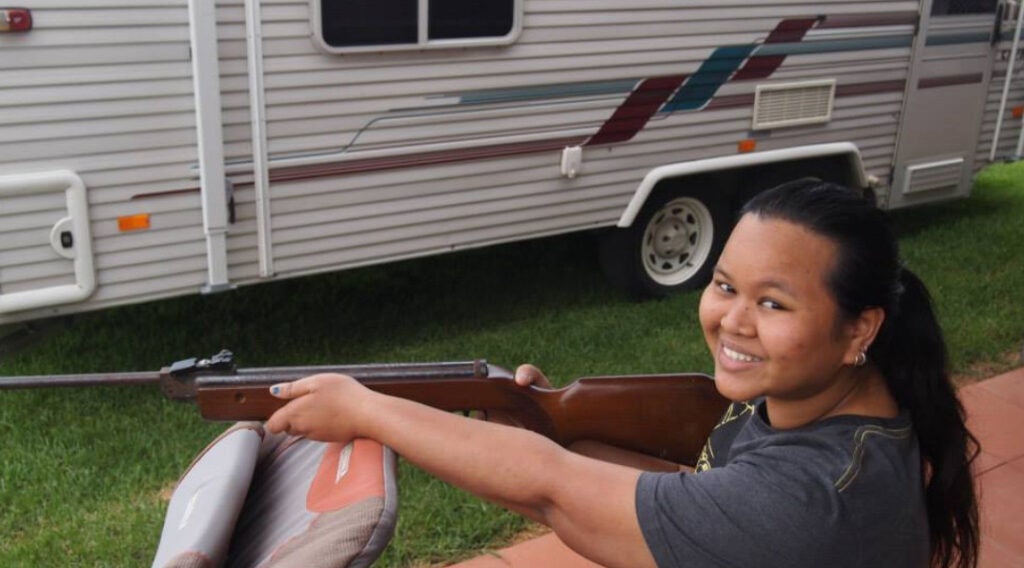
Below are some of the false and ableist beliefs that Malaysians still blindly accept about OKU, and how to change them and become better supporters of people living with disabilities.
1. Ask for permission before trying to help us.
Ask before you attempt to assist any disabled persons. We appreciate you wanting to help, but there is nothing more dangerous than an untrained, foolhardy, gung-ho person.
Once, at a cafe with no ramps, my friends and I were waiting for the pathway to clear so they may assist me in going on those steps.
But while I was conversing with them, the handlebar of my motorised scooter was unceremoniously lifted causing me to lose my balance and fall backwards.
The offending individual was on the phone with another person while attempting to help until he realised what he had done. He silently mouthed an apology without hanging up his phone and disappeared into the crowd.
Meanwhile I was able to avoid smashing the back of my head into the pavement and was not physically injured per se but it could have been much worse had I been less aware.
Oftentimes, an OKU will have very specific requirements for help or are simply trying to go about their lives. We do not need help all the time and will ask if we need it. So yes, ask for permission first.
2. Don’t expect an OKU person to respond to invasive questions.
Random strangers have come up to me and asked, “Can you have sex?” That is not polite conversation. The most irritating one is “You’re all alone. How do you do things?”
I would understand if you asked that to a child, but I am a grown-up. Nobody is obliged to give anyone a response, especially if it’s about anything private.
Sometimes however, I answer innocent questions from children who ask me why I have a scooter, and those instances are okay.
The rule of the thumb is: if you have a question, make sure it comes with a sincere intention and not in bad faith, or to degrade, or to offer medical advice. You are not a doctor!
Also, don’t touch our assistive devices, they cost a lot of money and are not toys.
3. Understand that anyone can become disabled: You, your parents, or your child.
People say, “OKU problems are not my problem.”
OKU problems are absolutely everybody’s problems, because addressing them will make the built and lived environment safer for everyone, not just OKU.
Anyone can simply become disabled at any point in time, it just needs an accident or a genetic predisposition to some diseases.
In fact, the COVID epidemic has been seen as a mass disabling event but the issue has been pushed under the rug.
4. Think inclusively, and try not to use ‘othering’ language with an OKU
‘Othering’ is when people view a person as different from them, mentally categorising them as part of the ‘out-group’ instead of part of their ‘in-group’.
It separates the disabled person from the general population, and it puts a mental barrier between the person speaking and the OKU person.
Sometimes people do this intentionally, but most people do it without even thinking about it. This subtle exclusion leads to unequal treatment of the people that are being ‘othered’.
Here are some common phrases that the media uses to describe OKU which can be ‘othering’ : ‘anak syurga’ (child of heaven), ‘handicapped’, ‘handicapable’, ‘challenged’, etc.
Terms such as these, as well as ‘differently-abled’ or ‘special’, were originally created to avoid stigma towards OKU, but in more recent times, have themselves begun to be used as a way to separate the OKU from the ‘normal’ people.
Instead of thinking about OKU as disability first, person second, start thinking of OKU as people first, disability second.
5. Don’t give in to ‘inspiration porn’ narratives that the media tends to sell
Among the disabled community, we refer to movies, articles, and novels about the disabled as ‘inspiration porn’.
Inspiration porn uses disabled people (and people in poverty) as props to carry a message instead of respecting their individuality and their needs. It also feeds into the problematic narrative that OKU can do anything if we ‘just try hard enough’.
Instead of thinking that disabled people are ‘noble’ for getting by on their own, society needs to recognise that disabled people need structural and social equity. They are not special needs, they’re UNMET needs. Just accept it as a fact.
Help an OKU not because they’re “anak syurga”, but simply because it is a measure of a just and equitable society to do so.
Conclusion
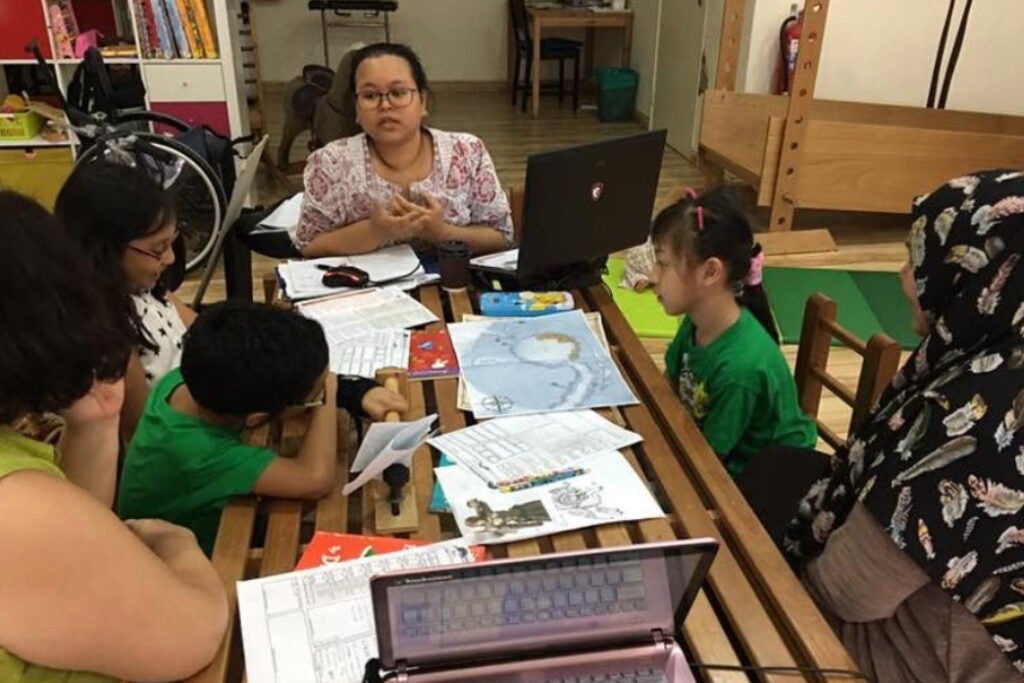
At the end of the day, I want people to move as far away as possible from the tragedy/charity and medical model of disability, which is inherently ableist.
We should instead embrace the Social Model of Disability: A model that focuses on creating equitable spaces, addressing discrimination and isolation, and identifying inaccessibility in all its forms.
I might have SMA, but my barriers in life are all from the extreme ableism within the laws, society and built environments.
The hostility I face is not as a person who has SMA, but as a person with disabilities. I don’t have special needs, I have UNMET needs. Support for the disabled community should be continuous and consistent.
We talk about having a kind and fair society but that will never be achieved unless we remove ableist mindsets from the current paradigm.
And remember kids, inspiration porn is bad.
How do you feel about this article?
Tell us what you think in the comments!
Follow Sha Roose on her Youtube channel Aitelyu! To know more about SMA and how you can help, go to WeCareJourney.
Also read: The OKU Of Malaysia Are NOT A Burden
The OKU Of Malaysia Are NOT A Burden: Discrimination Against And Misconceptions About Disability
You might also like
More from Real People
‘A RM100 fee cost a company 5 years of revenue’ shares M’sian
This story is about a Malaysian who learned that bureaucracy can be defeated simply by not arguing with it.A billing …
‘I quiet-quit, upskilled, and tripled my salary,’ shares M’sian engineer
This story is about a Malaysian who learned that loyalty without leverage leads nowhere in the corporate world.After years of …
‘I did everything right, and it still wasn’t enough’ shares M’sian graduate
This story is about a Malaysian graduate navigating big dreams in a job market where a degree no longer guarantees …






